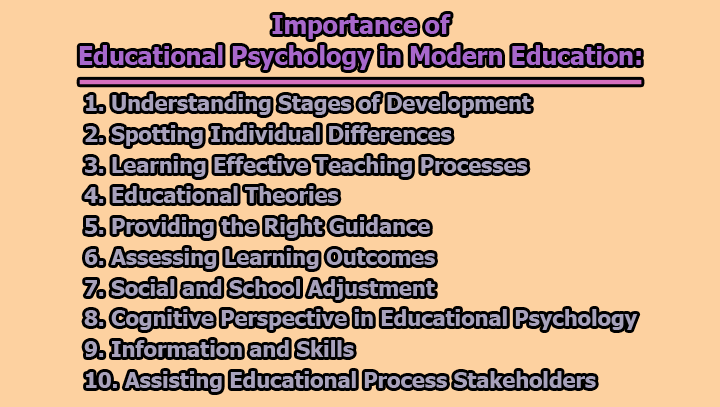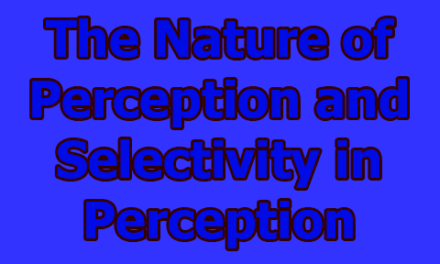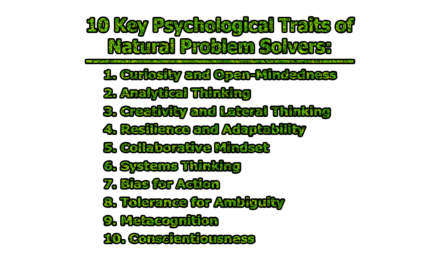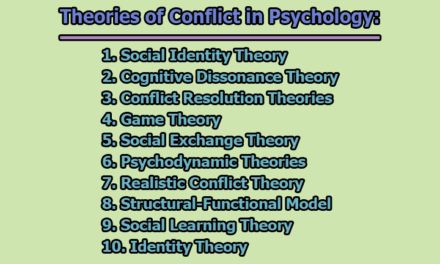Importance of Educational Psychology in Modern Education:
Educational psychology, a field that bridges the realms of psychology and education, plays a pivotal role in shaping the effectiveness of teaching methods, classroom environments, and student outcomes. As the educational landscape becomes more diverse and complex, understanding the importance of educational psychology becomes indispensable for educators. This article explores the importance of educational psychology in modern education.
1. Understanding Stages of Development: One of the fundamental aspects of educational psychology is its exploration of the various stages of human development. From infancy to adulthood, individuals undergo distinct physical, mental, and emotional changes. Educational psychologists delve into these developmental stages, providing educators with insights into the unique needs and characteristics associated with each phase. This understanding forms the foundation for tailored teaching approaches that accommodate the diverse developmental trajectories of students.
2. Spotting Individual Differences: Educational psychology acknowledges the inherent diversity among students in a classroom setting. Recognizing and appreciating individual differences, including aptitude, cognitive capabilities, interests, attitudes, and requirements, is crucial for effective teaching. By embracing these differences, educators can create inclusive learning environments that cater to the specific needs of each student, fostering a sense of belonging and engagement.
3. Learning Effective Teaching Processes: Recent advancements in educational psychology have contributed to the evolution of teaching concepts, methods, and approaches. Play-based learning strategies, for example, have gained prominence as effective tools for making education both enjoyable and impactful for children. Educational psychologists leverage psychological principles to design curricula that align with students’ developmental characteristics, learning preferences, and societal demands, thereby enhancing the overall efficacy of teaching processes.
4. Educational Theories: Educational psychology encompasses a wealth of theories that shed light on the learning process, measurement methodologies, and factors influencing learning outcomes. Educators armed with this knowledge can adopt evidence-based practices, staying abreast of the latest developments in educational theories and adapting their teaching methods accordingly. This dynamic approach ensures that teachers remain effective and responsive to the ever-changing landscape of education.
5. Providing the Right Guidance: Teachers are not just purveyors of knowledge; they also play a crucial role in guiding students on their educational journey. Educational psychology equips educators with the understanding of students’ learning needs and the ability to provide tailored support. This guidance extends beyond academic challenges to include emotional and social aspects, contributing to students’ overall well-being and success.
6. Assessing Learning Outcomes: Educational psychology has significantly contributed to the development of tools for assessing learning outcomes. Exams and cognitive ability measurements help educators understand students’ mental skills, intellect, and temperamental attitudes. Recognizing individual differences enables teachers to provide targeted support, ensuring that no student is left behind and that each can explore alternative domains where they can excel.
7. Social and School Adjustment: The social and academic adjustment of students to the educational environment is a critical aspect of educational psychology. This field emphasizes the importance of interpersonal relationships within the classroom, fostering a positive and supportive atmosphere that enhances both social and academic progress.
8. Cognitive Perspective in Educational Psychology: Cognitive psychology within educational psychology delves into the intricacies of thought processes, learning abilities, memory retention, and information processing. Understanding these cognitive aspects empowers educators to address challenges related to motivation, memory, and problem-solving skills, enhancing the overall quality of education.
9. Information and Skills: Educational psychology offers invaluable information and skills to academic staff, enabling them to discern reliable educational theories from subjective opinions. This scientific approach ensures that teaching methods are grounded in evidence, promoting effective and evidence-based learning outcomes.
10. Assisting Educational Process Stakeholders: Beyond the classroom, educational psychology assists stakeholders in the educational process by identifying various aspects, including learner characteristics and the academic environment. Evaluation and measurement tools, as well as educational tests, help assess outcomes and contribute to a comprehensive understanding of the theoretical aspects of education. This knowledge, when applied systematically, enhances the overall effectiveness of classroom practices.
In conclusion, the importance of educational psychology in modern education is vast and multifaceted. From understanding developmental stages to fostering inclusive learning environments, from adopting effective teaching processes to providing tailored guidance, educational psychology serves as the backbone of contemporary educational practices. Educators who embrace the principles of educational psychology are better equipped to meet the diverse needs of their students, ultimately contributing to the holistic development and success of each individual in the classroom.

Library Lecturer at Nurul Amin Degree College










